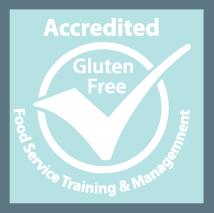
Gluten-Free Food Service is a program of the Gluten Intolerance Group®
Make a Donation
Page Last Updated
April 15, 2009
Frequently Asked Questions
Gluten
What is gluten?
Who should eat gluten-free food?
How do I know if I have celiac disease?
How can I learn more about celiac disease?
Does gluten-free mean individuals with severe wheat allergy can eat the product?
Gluten
Gluten in the food industry refers to storage proteins found in all grains. These storage proteins are beneficial in food production.
Gluten-free, to the medical community refers only to the storage proteins known to damage the small intestine for persons with gluten sensitive enteropathy (celiac disease and dermatitis herpetiformis). Gluten-free diets avoid the storage proteins found in wheat, rye, and barley.
Who should eat gluten-free food?
People who have been advised by their physician to be on a gluten-free diet should eat gluten-free food. This would include, but not be limited to, people with celiac disease, or gluten intolerance.
How do I know if I have celiac disease?
Blood tests are available to screen for celiac disease but a positive small bowel biopsy is required to confirm the diagnosis of celiac disease.
How can I learn more about celiac disease?
The Gluten Intolerance Group® can help you learn more about Celiac Disease. The website is www.gluten.net.
Does gluten-free mean individuals with severe wheat allergy can eat the product?
Not necessarily, you should consult your physician. Gluten-free foods are foods safe for persons with celiac disease. They have none or very low levels of the 'gluten' proteins that could be harmful to persons with celiac disease. Celiac disease is a t-cell mediated reaction. Wheat allergies involve an IgE-mediated reaction to the wheat proteins albumin and globulin fractions. In rare situations, gluten could also induce an IgE-mediated reaction.
Copyright 2007 Gluten-Free Food Service Accreditation. All Rights Reserved.
